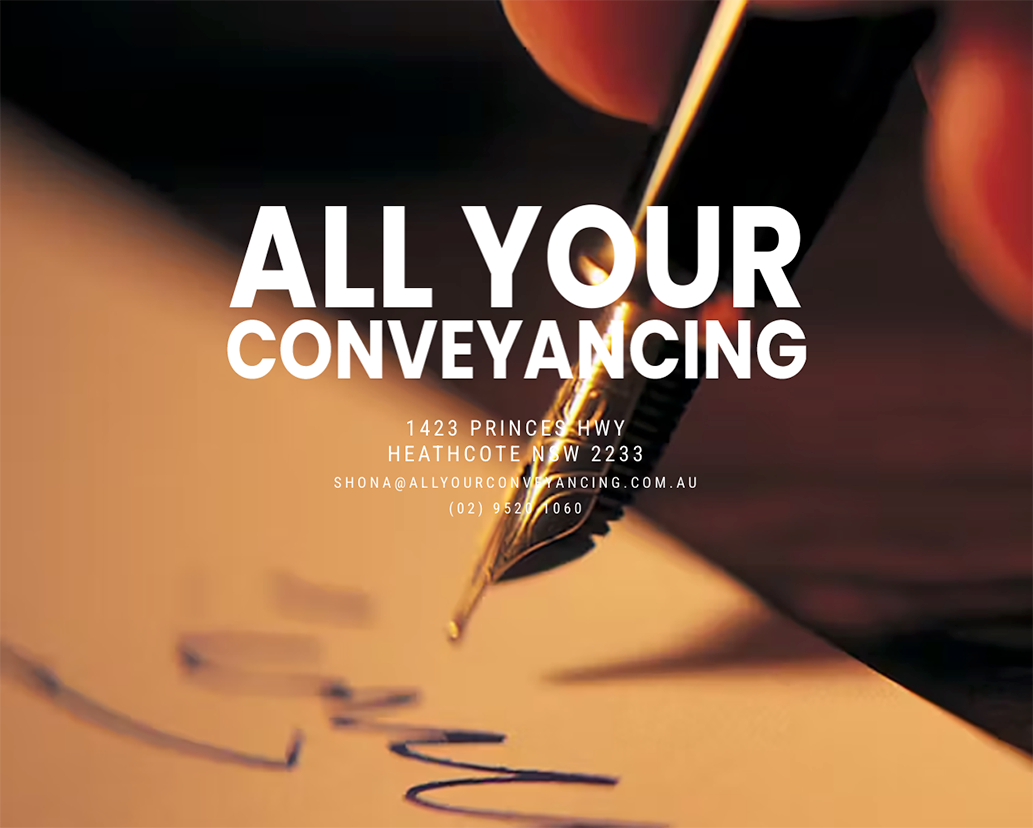Welcome to All Your Conveyancing
Buying a property may be the greatest investment of your life, it may be an emotional one for some as well. We are here to guide you through your journey every step of the way and understand each client has different needs.
All Your Conveyancing is a professional boutique Conveyancing practice and has operated since 2010 and holds an unrestricted conveyancing licence. Conveyancing is the process of transferring the legal title of ownership from one party to another and at All Your Conveyancing we have the experience, patience and expertise to assist you through the entire transaction.
Since all we do is conveyancing, we are wholly focused on your transaction and are not distracted by other legal work. We are fully licensed, insured and qualified to protect your interests throughout the entire conveyancing transaction.
All Your Conveyancing will provide you with exceptional customer service and the plain language approach and will keep you informed throughout your transaction.
We are a member of the Australian Institute of Conveyancers (NSW Division) and are bound by the Division's code of conduct and code of ethics and we welcome all inquiries.
- Buying and Selling of Residential Properties, Developments and Land
- Buying and Selling Off the Plan Projects
- Buying and Selling Qualified, Limited and Company Title properties
- Torrens, Strata, Community and Neighbourhood
- Mortgages - including discharges and refinances
- Stamp Duty, First Home Owners Grants and First Home Plus applications
- Organising reports such as pest, building, strata, survey, valuation, engineer and building certificates, to name a few
What is a Conveyancer?
When participating in a conveyancing transaction, a Certified Practicing Conveyancer is able to assist you. A Certified Practicing Conveyancer undertakes certain education and practical training before being entitled to hold a conveyancer's licence.
In addition to this, a Certified Practicing Conveyancer must hold Professional Indemnity Insurance and must complete a minimum amount of training each year to ensure that each Conveyancer remains up-to-date with any changes to the conveyancing profession and legal implications.
All Your Conveyancing is a member of, and has the support and backing of the only professional body representing the conveyancing profession in NSW, the Australian Institute of Conveyancers NSW Division.
Frequently Asked Questions About Conveyancing
What is conveyancing?
Put simply, conveyancing is the legal process of transferring the title of a property from one person to another.
Why should I use a conveyancer?
Buying or selling property is one of the biggest financial transactions of your life. Due to the financial and legal aspects of transferring property, the consequences of making a mistake can be both costly and heartbreaking.
By having a licensed conveyancer take care of your property transfer, their qualifications and experience can help protect your assets.
A licensed Conveyancer has an in-depth understanding of the law concerning property transactions, they are required by law to carry professional indemnity insurance and fidelity insurance, and unlike certain solicitors that offer conveyancing, they can focus solely on property.
What is the cooling off period and how does it affect me?
A cooling off period is the right of a purchaser of property to cancel the agreement within 5 working days. It offers some protection to purchasers that may have rushed into a contract to purchase property and can be used to finalise financial arrangements, and carry out building, pest and strata inspections. If you cancel the agreement (or rescinding, as it is known) will cost the purchaser 0.25% of the total purchase price.
The cooling off period does not always apply (at auction, for example) and can be waived providing a 66W certificate is signed by a conveyancer who has briefed his or her client with regard to the implications involved of waiving the cooling off period.
What is a disbursement?
A disbursement is one of the expenses incurred during the process of searching and obtaining a certificate from local government authorities or local councils.
What happens if either party cannot settle on the due date?
The vendor or purchaser can issue a 'Notice to Complete' which means the vendor or purchaser has 14 days (including weekends and public holidays) to settle the matter. If left unsettled, the purchaser has the right to terminate the contract and is eligible to receive their deposit back. The purchaser may also apply to the Court to have the vendor complete the agreement and hand over possession.
The vendor is entitled to charge the purchaser interest for the number of days that the settlement is delayed. The contract usually stipulates the applicable interest rate. When a 'Notice to Complete' is issued, the vendor may terminate the contract after the 14 days has expired and keep the deposit, and can legally place the property back on the market for sale.
What happens at settlement time?
Settlement is the finalisation of the sale or purchase process. There are usually four parties involved - the vendors and purchasers conveyancers and the banks for the vendor and purchaser.
Settlement is completed via PEXA, an online settlement platform and all properties are settled electronically and documents lodged via land registry.
If, prior to settlement, the property in question has been damaged, there is a sufficient amount of time to take care of discrepancies prior to settlement. Once the settlement date arrives, the keys can be handed over to the purchaser and the deposit is released (from trust) to the vendor
Who notifies the authorities that I have purchased a property?
When your transfer papers are lodged for registration on settlement, the council, water and Registrar General are automatically notified of the new purchase. Other providers, however, such as electricity and NBN will need to be notified by the purchaser directly.
Meet Shona

Shona Riley is a Certified Practising Conveyancer who has over 15 years of conveyancing experience and holds an unrestricted conveyancing licence.


